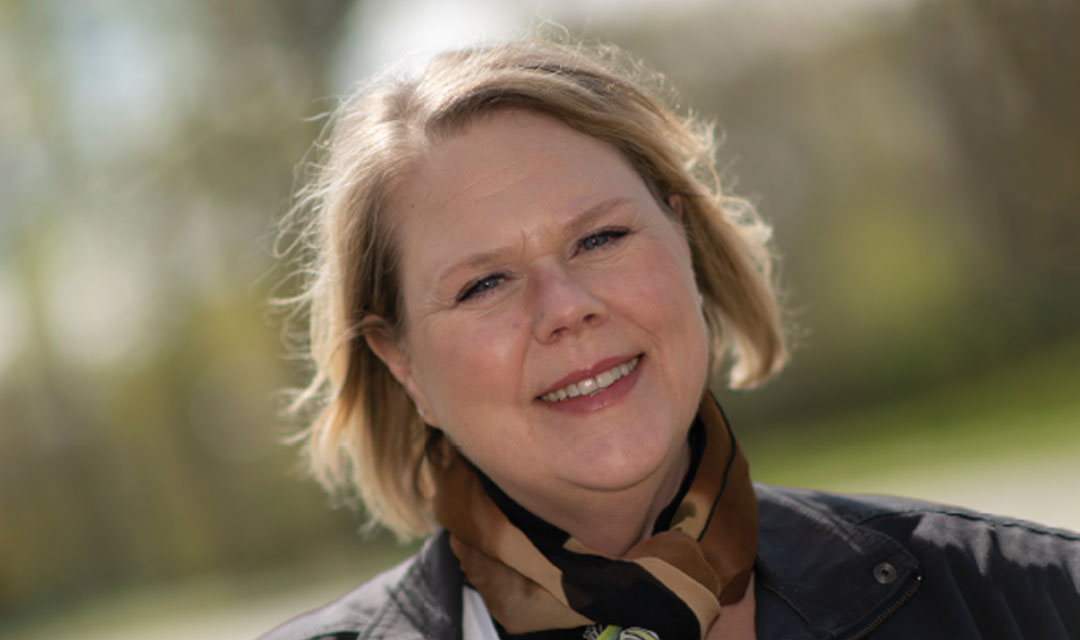“I feel fantastic. There’s nothing that comes up that makes me nervous, and I trust my body so much more than I did a year ago.”

Kjersti Myhre Cronin hadn’t felt really well for several years. The 51-year-old Woodbridge resident was suffering from breathlessness, which she attributed to her pack-a-day cigarette habit. She was always worried about her ability to pull off even simple physical tasks—something she refers to as “asking permission to do everything.” She remembers, prior to a vacation, asking her husband, “Well, do you think I can climb a hill?” Yet she didn’t see a doctor because, as she later realized, she wasn’t in the habit of listening to her own body.
In March of 2021, she began to feel bloated and “off.” On March 15, she came home from work feeling ill and exhausted. She slept for a couple of hours and then, she says, stopped breathing.
Her husband called 911, and she was rushed by ambulance to the Emergency Department at Robert Wood Johnson University Hospital (RWJUH) Rahway. There, she was diagnosed with congestive heart failure—a condition in which the heart is unable to pump efficiently—and a blocked coronary artery.
Myhre Cronin was transferred to Robert Wood Johnson University Hospital in New Brunswick (which, like RWJUH Rahway, is an RWJBarnabas Health facility). She underwent triple coronary artery bypass surgery and a valve replacement, and later, a procedure known as a pericardial window, in which a piece of the sac surrounding the heart is removed to drain excess fluid.
“The medical crisis was terrible and scary—I was very, very afraid of what my future was going to look like—but it solved a huge mystery for me about the way I’d been feeling,” Myhre Cronin says.
Now, she just needed to get better. Two months after her final surgery, that started to happen when she began a 12-week course of cardiac rehabilitation at RWJUH Rahway.
A New Beginning
“The goal of cardiac rehabilitation is to help patients feel better, reduce their stress, reduce their blood pressure, help strengthen their heart muscle and improve their overall conditioning,” explains cardiac rehab nurse Denise Cherepanya, RN, who worked with Myhre Cronin. Research has shown that cardiac rehab programs reduce the risk of future cardiovascular problems and death from heart disease.
Patients attend rehab three times a week for 12 weeks, with each session lasting roughly an hour. Workouts are individually tailored and involve the use of a variety of exercise machines.
Because a herniated disc in her neck made using the rowing machine difficult, Myhre Cronin was put on the treadmill, the NuStep (a recumbent cross-trainer) and the arm machine. Like all patients, she started her workout with a five-minute warm-up and ended it with a five-minute cooldown, alternating time on the machines with walking. Her blood pressure and heart rate were carefully monitored to ensure that she was working out safely. “If patients need to sit at any point because they’re tired or out of breath, we let them sit,” says Cherepanya.
Initially, Myhre Cronin was frustrated by the pace of her progress. “I was walking 1.6 miles per hour on the treadmill, and I thought that was insanely slow,” she says. But the nurses—she calls them her “cheerleaders”— told her she was actually doing well and setting a good foundation for her recovery.
“The nurses were really good at explaining why I needed cardiac rehab,” Myhre Cronin says. “I felt very safe. Their level of expertise came across for sure, but in a very, very supportive way.”
“It’s common for rehab to be a little bit daunting at first,” says Cherepanya. “All our patients are deconditioned in the beginning, but over time—it could be three weeks, it could be a month—they start to feel better.”
For Myhre Cronin, cardiac rehab was a process not just of strengthening her heart but also of learning to listen to her body. She noticed, for example, that her heart would race when she became dehydrated, so hydration became an essential part of her workout.
At about the four-week mark, she says, she started to turn a corner. After completing rehab, she was given an exercise program and was strongly advised to follow it. She joined a gym a week later. Working out had become such a habit, she says, that she couldn’t imagine not continuing.
Cherepanya stresses that faithful attendance at rehab is essential to its success, and Myhre Cronin, she says, was diligent about coming regularly. A major reward of Cherepanya’s job, she notes, “is seeing a patient walk out of rehab a totally different person.”
That was certainly the case for Myhre Cronin. Before rehab, she couldn’t comfortably walk more than a block. Today, walking is an intrinsic part of her life.
Nearly a year after her first surgery, she’s no longer asking for permission to do the things she wants to do. “I feel fantastic,” she says. “There’s nothing that comes up that makes me nervous, and I trust my body so much more than I did a year ago.”
To connect with a top cardiovascular specialist at RWJUH Rahway, call 888-724-7123. To learn about cardiac rehabilitation at RWJUH Rahway, call 732-499-6056.